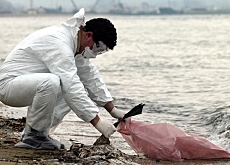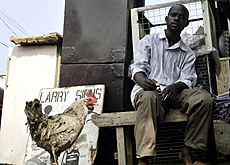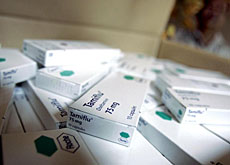Swiss play down Europe bird flu risk

Swiss veterinary authorities say no extra measures will be taken following the news that the deadly bird flu virus H5N1 has reached neighbouring Italy.
The Italian health ministry said on Saturday that the virus had been found in wild swans in southern Italy. Greece and Bulgaria have also confirmed cases.
This is the first time that the strain has been detected in Italy.
Italian Health Minister Francesco Storace said it was found in swans in three Italian regions – Puglia, Calabria and Sicily. The swans arrived from the Balkans, he said.
The news came on the same say that Greek officials said the H5N1 virus had been confirmed in three dead swans found in northern Greece.
The European Union also announced on Saturday that the strain had been found in three wilds swans in Bulgaria, in an area close to the Romanian border.
The H5N1 virus, which originated in Asia, has so far killed more than 80 people. No human cases have been reported so far in Italy, Greece or Bulgaria.
The European cases come just a few days after avian flu was detected in Africa for the first time.
No extra measures
Reacting to the news, the Swiss Federal Veterinary Office said on Saturday that it would not be carrying extra emergency measures.
“We are not faced with a situation that’s really new,” the Veterinary Office’s Marcel Falk told swissinfo.
“We knew that the Black Sea and this part of the Mediterranean were affected. This is not alarming, but it confirms that the region is strongly affected in terms of wild birds.”
Falk said that Greece and Italy were taking or had already taken measures to prevent the virus from being transmitted to domestic fowl.
The Veterinary Office said that it did not believe there was any risk to Switzerland from the latest cases.
Imports
In terms of poultry-related imports, Falk said that there would be no ban on such products from Italy or Greece.
“First of all the affected birds are wild birds, not domestic fowl,” he said.
“Secondly, these are EU countries, and we apply a particular strategy to EU countries. It’s up to the country to take protection measures for poultry and to guarantee that it won’t export any infected products.”
The Veterinary Office reiterated that it would, however, continue to assess the situation. A decision on whether to take extra measures, such as re-imposing a ban on keeping domestic fowl outdoors, is due to be taken over the next two weeks.
swissinfo
The H5N1 virus was first recorded in human in 1997 in Hong Kong.
It then spread to other several countries in Asia.
Last year it reached Turkey, Romania and Croatia.
At the beginning of February it was reported for the first time in Africa in Nigeria.
Two EU countries have now announced cases: Italy and Greece.
In total, there have been 160 human cases of the virus. More than 80 people have died.
From October 26 to December 16 last year, the autumn migration period, Switzerland banned the keeping of domestic poultry outdoors.
Veterinary experts took samples from 800 migratory birds, but found no trace of bird flu.
Switzerland also banned imports of poultry products from affected countries and airport checks have been stepped up. Anti-flu drug Tamiflu has been stockpiled to treat a quarter of the Swiss population.
Experts have said that a bird flu outbreak in Africa could be more serious than the one in Asia, given Africa’s lack of diagnostic and surveillance infrastructure.

In compliance with the JTI standards
More: SWI swissinfo.ch certified by the Journalism Trust Initiative



You can find an overview of ongoing debates with our journalists here. Please join us!
If you want to start a conversation about a topic raised in this article or want to report factual errors, email us at english@swissinfo.ch.